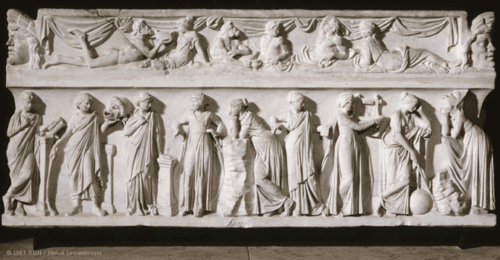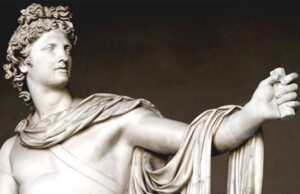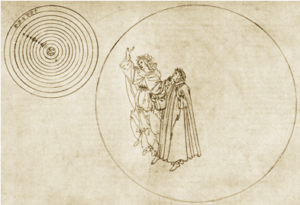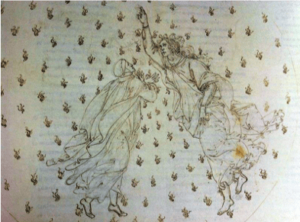On this day that witnesses the celestial marriage of the Divine Hermaph-rodite* between Beauty and Thought, we publish the Foreword to an essay we are working on dedicated to the Muses: only “the realization of beauty will save the world”.
“The Muses have a very high, indeed unique, place in the divine hierarchy. They are called daughters of Zeus, born of Mnemosyne, the Goddess of memory; but this is not all, for they, and they alone, bear, like the father of the Gods himself, the appellation of Olympians, an appellation by which men used to honour the Gods in general, but – at least originally – no God in particular, with the exception of Zeus and the Muses.” [1]

Clio, Thalia, Erato, Euterpe, Polyhymnia, Calliope, Terpsichore, Urania and Melpomene – Marble sarcophagus; Roman art, 150-160 AD (Paris, Louvre)
ACADEMY OF THE MUSES
Foreword
There are spaces, sounds and lights that are invisible and silent to the senses.
Of these worlds we wants to sing.
And the Muse is our Model to invoke and the first Beacon to follow.
The wrath of Peleus’ son… O Goddess, sing !
“The literature and culture of the entire West … start in the first verse of the Iliad by invoking the Muse; in the beginning, then, is the highest, sacred voice of the mousiké. … Its importance in the cosmic order is essential: it fulfils the superb glory of the divine work of creation and represents its soul.” (WFO)
The Muse sings and dances the Music of the Spheres: the Muses “guard the secret of a sacred dimension that exceeds ordinary life. They are like a flowing fluid, they are like water, not only because water is the principle of life, but also because water is the mind itself: still, crystal-clear water that, like a mountain lake, reflects the ideas and forms of thought, or water that ripples and churns, threatening and gloomy, in the changing whirlwind of emotions.
The Muses are mental waters, superior and celestial waters, in which the images of the world and of being appear. … The voice of the divine maidens does not merely celebrate what has been created, but commands it and, in commanding it, adorns it: it endows it with meaning and beauty. The word is not a supplement that is added to what exists, but a power that fulfils the world and makes it be in all its splendour. By pronouncing and singing the things that inhabit the universe, the voice of the Muses gives them substance and value.” [2]
The Muse is the Daughter of the Cosmic Mind, she is the Teacher of sound wisdom and the Mother of rebirth to higher resonances: “The feature that marks the nature of every being is a word-song with its own intonation and pitch. Therefore he who knows the sound-word of each thing and knows how to understand its music also possesses the fundamental knowledge to act upon reality and to modify it: the knowledge of the word is the secret power of a sound that becomes action, moving and transforming, at will, every existing datum. The very body of the gods is interwoven with metres and songs. It follows that he who has perfect mastery of that sound wisdom can, in turn, ascend to heaven: with the right rhythm and the right song, one can transform one’s transient nature and become immortal.” (DSM)
To penetrate the mystery of the Muses one must therefore “begin by questioning what their name encompasses. … ‘Μούσα’ (Muse) is said to derive from a word of Lydian origin, móus or ‘source’: the goddesses with the marvellous voice would, to all intents and purposes, have the nature of ‘aquatic’ creatures, like the Naiads, the nymphs that inhabit fountains and riverbanks (Vatican Mythographs 3,8,22). But Muse could also be connected to the root from which terms such as manthánein, ‘to learn’, mnéme, ‘memory’, or mens, ‘mind’ derive: the maidens of Olympus and Mount Helicon would be, from this point of view, powers of thought. Plato, for his part, believed that the name contains the same meaning as the verb mósthai, ‘to aspire’, ‘to desire’, ‘to seek’ (Cratylus 406 a): the Muse would be the very yearning for knowledge, the tension of the search, the desire for truth and the path that leads to it. Diodorus Siculus, offering a further cue, suggests a juxtaposition to the sphere of the mysteries (Historical Library 4.7): Muse is said to derive from múein, ‘to initiate’, because – in a similar way to the Eleusinian rituals – the Muses preside over a sacred initiation, giving mortals access to a higher and different form of knowledge, opening up to them the way to the most beautiful and admirable things. … their power extends not only to the most beautiful conceptions of thought, but also to the symphonic interweaving of all the things that are in the universe (Iamblichus, Life of Pythagoras). [3]

For, according to Pythagoras, the nature of cosmos also has its own music and sound. … That is why, according to Pythagoras, the Muses are not only divine maidens singing in the abode of Zeus, but the very voice of planets and stars. And it is towards such celestial melody that all human music should strive, in order to be in symphonic accord with the Hyperborean light [4] of Apollo and the synchronous dance of the daughters of Memory. From the soft glow of the paradise of the North, as well as from the terse splendour of Olympus, the infallible archer, accompanied by the Muses, beckons and points the way up to the stars, so that humans may harmonise with the divine rhythm of cosmic order.” (DSM)
*
The Muses teach us how to navigate the Waters of Life on a Path of Beauty, on the light but indestructible sailboat of a lofty, smiling and solemn Thought, propelled by the fiery need for Truth.
To such an ascending spiral to the sacred Temple of Harmony we give the platonic Name [5] of:
Academy of the Muses
*
I pray Memory and her daughters
to grant me a happy outcome
for blind are the minds
of men who without the Muses
seek the profound path of wisdom.
(Pindar, Paeans 7 b)
As we begin our journey in this Hall of heavenly Wisdom, let us invoke them with Dante, Supreme Poet:
O Muses, O high genius, now assist me !
O memory, that didst write down what I saw,
Here thy nobility shall be manifest !
(Inferno – canto II, 7-9)

Sandro Botticelli, Paradiso – Canto II, Ascent to the Moon
O YE, who in some pretty little boat,
Eager to listen, have been following
Behind my ship, that singing sails along,
Turn back to look again upon your shores;
Do not put out to sea, lest peradventure,
In losing me, you might yourselves be lost.
The sea I sail has never yet been passed;
Minerva breathes, and pilots me Apollo,
And Muses nine point out to me the Bears.
(Paradiso – Canto II, 1-9) [6]

Sandro Botticelli, Dante and Beatrice
* Heliocentric conjunction of Mercury/Hermes and Venus/Aphrodite at the initiatory beginning of Aries.
[1] Excerpt from Walter Friedrich Otto (WFO), “” (The Muses. And the divine origin of speech and song)
[2] From: Davide Susanetti (DSM), “Luce delle Muse – La sapienza greca e la magia della parola” (Light of the Muses. Greek wisdom and the magic of the word)
[3] “… Pythagoras was also the first that advised them to build a temple to the Muses, in order that they might preserve the existing concord. For he observed that all these divinities were called by one common name, [the Muses,], that they subsisted in conjunction with each other, especially rejoiced in common honors, and in short, that there was always one and the same choir of the Muses. He likewise farther observed, that they comprehended in themselves symphony, harmony, rhythm, and all things which procure concord. They also evince that their power does not alone extend to the most beautiful theorems, but likewise to the symphony and harmony of things.” (Iamblichus “Life of Pythagoras)
[4] “The absolute North, which essentially coincides with the axis of the pole and with the pivot of celestial rotation, the region of the Hyperboreans, completely inaccessible to ordinary mortals, is the home of the sun and of life: the place that, within the confines of the world, represents the greatest tangency with the higher plane of being. Apollo’s remote home is, to all intents and purposes, a symbol of that invisible and secret centre on which depend and to which are connected, by necessary influence and validation, the sacred centres otherwise visible in the world inhabited by humans. The Hyperborean pole is the source that feeds and sustains the ‘navel’ of Delphi as well as the golden Delos. From that North, it is said, gifts were periodically sent … wisdom uninterruptedly transmitted from a light and dimension of a superior nature. Symbol of a living tradition founded precisely by virtue of that never-ending bond with its invisible ‘pole’.
… Each time, to travel to those ends of the world, Apollo climbs into a chariot drawn by white swans [the bird that symbolises the Soul, the Solar Angel, and its eternity], flying through the ways of the air. And then, when it is time to return, it is always these admirable birds, akin to the god’s singing and solar nature, that lead him back to the Greek land, to his sanctuaries and the cities dear to him.” (DSM)
[5] “Plato chose as the headquarters of his school a place shaded by tall trees, just outside the Sacred Gate of Athens: a grove consecrated to the hero Academus. There he erected a sanctuary in honour of the Muses. The Platonic Academy was founded as a thíasos dedicated to the divine maidens.” (DSM)
[6] Mentions of the Muses in the Divine Comedy
Muses: Inferno II, 7 | Purgatorio 1, 8; XXII, 102; (Virgins) XXIX, 37;
Calliope: Purgatorio I, 9 | Urania: Purgatorio XXIX, 41 | Clio: Purgatorio XXII, 58 | Polyhymnia Paradiso XXIII, 56.





